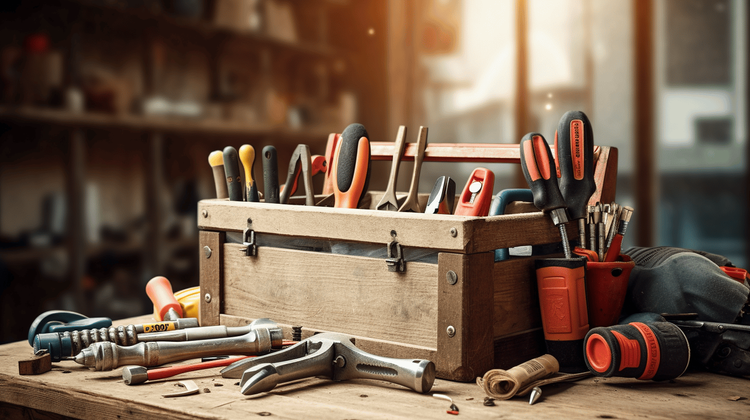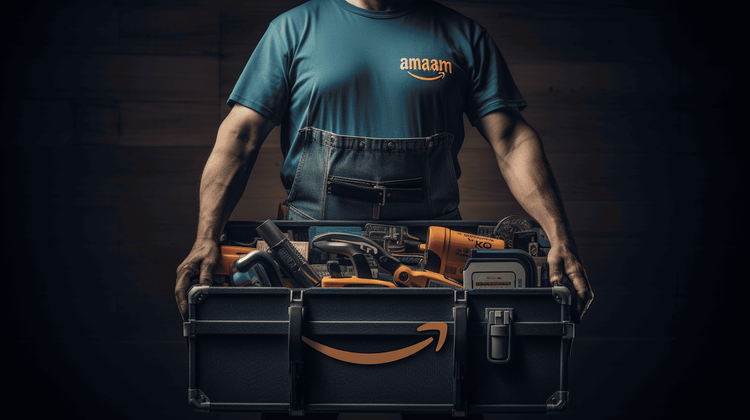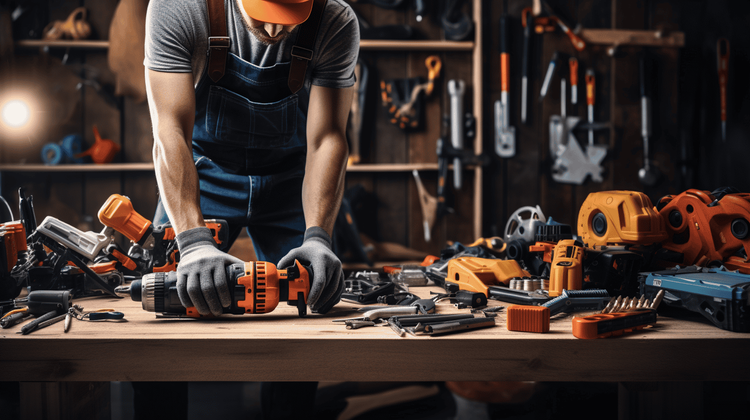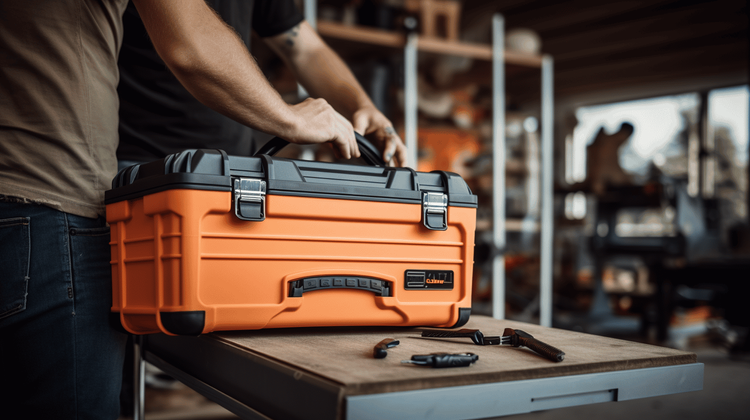DIY Projects in 2024: A Sneak Peek into Economical Tool Selections
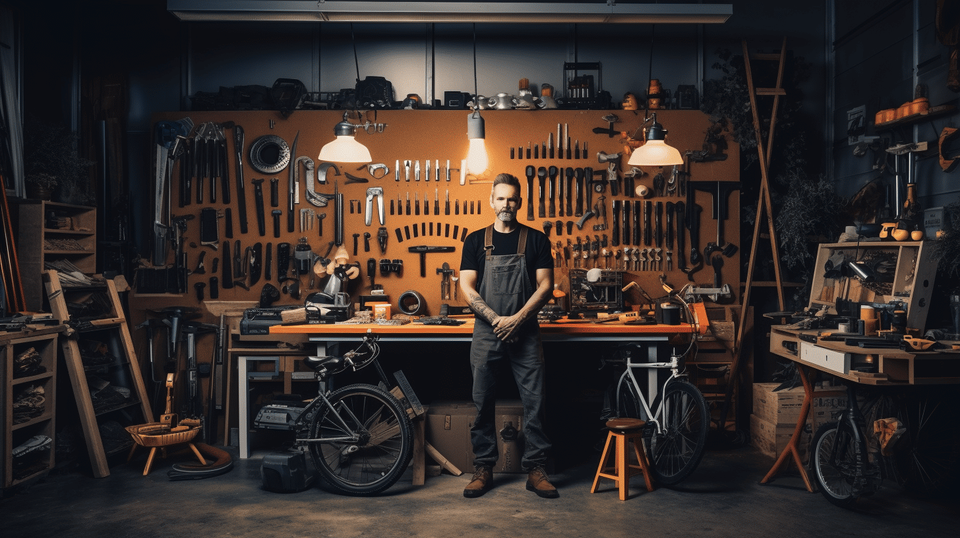
The time-honoured culture of DIY, "Do It Yourself", isn't going anywhere soon. On the contrary, it's experiencing somewhat of a renaissance. As we push forward into 2024, homes worldwide can expect an orchestra of delightful DIY projects brought to life, replacing the humdrum of outsourcing tasks. There's a thrill in rolling up one's sleeves, grabbing a toolbox, and breathing life into creative projects.
In this age of individual creativity and self-reliance, using just the right tools for the job is crucial. Choosing wisely can help you save a few bucks and give your project a professional touch. Considering economical options doesn't necessarily mean compromising on quality or function.💡
So, let's dive into the world of DIY projects for 2024. We'll delve into why these projects are worth your time, upcoming trends, and how to make smart, budget-friendly tool choices that won't break the bank. This is your guide to a successful, rewarding DIY journey in the coming year. Buckle up, and get ready to create!
Why DIY Projects?
If you're keen to make your home a reflection of your personal style, you're health-conscious, or simply on a budget, Do-It-Yourself (DIY) projects may be just the ticket. With a touch of creativity and a pinch of determination, anyone can enjoy the vast array of benefits these projects offer. They are not only cost-effective but also an excellent way to develop new skills, and bring immense personal satisfaction. We'll explore each of these reasons in depth below.
Economical Advantages
A significant reason many people opt for DIY projects is to save money. With the right tools and a bit of knowledge, you can create functional and beautiful items, often at a fraction of the retail cost. Let's take a look at some key economical advantages:
- Cost-saving: Buying items, particularly furniture and home decor, can be expensive. DIY allows you to create these items yourself, often saving a considerable amount of money.
- Long-term Investment: Tools you purchase for DIY projects are a long-term investment. Once you've acquired them, you can use them for multiple projects in the future.
- Customization: DIY affords you the opportunity to customize items to your liking, saving you from potentially costly searches for specific retail items.
Development of Skills
DIY projects are an enjoyable way to learn new skills, and broaden your expertise. Each project undertaken presents a unique set of challenges, encouraging you to tap into and develop different skills. Here's how:
- Problem-solving: DIY projects often require creative solutions, contributing to improved problem-solving skills.
- Technical Skills: Whether you're crafting, sewing, or woodworking, you'll gain practical skills throughout the process.
- Patience and Perseverance: DIY inherently teaches patience, as projects may take time and multiple tries to get right.
Personal Satisfaction
Last but not least, the personal satisfaction derived from completing DIY projects is immense and multi-faceted.
- Productivity: Using your time to create something useful or attractive gives a sense of accomplishment.
- Creativity: DIY projects stimulate creativity, allowing you to express yourself in unique ways.
- Therapeutic: Many find the act of creating therapeutic, as it lets you focus on the task at hand, fostering mindfulness.
In a nutshell, DIY projects are not just a hobby - they're a brilliant way to save money, learn new skills, and bring immense personal satisfaction. 🙌 So what are you waiting for? Get on board the DIY train, and let's start creating!
Forecasting DIY Trends in 2024
DIY or Do-It-Yourself has been gaining traction over the years, with people around the globe recognizing it as a cost-effective and personally satisfying way to bring about a change in their homes, style, and lives. With an enticing blend of creativity and pragmatism, the DIY trend is rising from strength to strength. Here are some innovative trends that we believe are poised to shape the DIY landscape in the year 2024.
Popularity Rise of DIY Projects
The renaissance period of DIY is upon us. 🚀 More and more people are taking up DIY projects as they discover the benefits both aesthetically and financially. But what's causing this growth? There are several factors at play here:
- Increased sense of self-sufficiency: The gold-star 🌟 of DIY comes from the ability it gives people to be in control of their projects. You're not just saving money; you're creating something unique.
- Rise of online platforms: DIY blogs, YouTube channels, and social media pages are making it simpler for novices to embark on DIY journeys. The treasure of step-by-step guides and examples available online is a significant contributor to the increased popularity of DIY projects.
Shift to Sustainable Projects
More people are moving towards eco-friendly options, and the DIY sector is no different. 💚 The focus is shifting to upcycling, recycling, and reusing, aiming to minimize waste and reduce their carbon footprint. Here's why:
- Growing environmental consciousness: Climate change concerns are leading to a surge in sustainable DIY projects. Bamboo furnishings, recycled art, and composting stations are just the tip of the iceberg! 🌎
- Cost and availability: Eco-friendly materials are often cheaper and more accessible.
Adoption of Technology in DIY
Think the DIY world is free from the grips of technology? Think again! As the world progressively digitizes, the DIY industry is moving with the times.
- 3D printing: From decor items to tools, 3D printing allows DIY enthusiasts to produce whatever they need at the click of a button.
- Virtual Reality (VR): DIY enthusiasts can now use VR to visualize their projects, removing the guesswork from their projects.
Packing up, the year 2024 promises to be an exciting year for the DIY industry. From the rise in popularity to a focus on sustainability and technology, DIY is set to push the boundaries even further. These trends reflect a fascinating shift in the way we view DIY, one where technology, environment consideration, and individual creativity curiously intertwine. So, get your tools ready and let's reimagine the future of DIY! 🛠️💡🖼️
Tool Selection for DIY Projects
Have you ever started a DIY project, only to realize halfway through that you're not equipped with the right tools? We have all been there and learned the hard way that tool selection is paramount for any DIY endeavor. From woodworking to home repairs, the right tool can make all the difference between a successful project and a total flop. 🛠️
Let's put your tool selection worries to bed as we navigate through the vast tool industry, analyze the significance of choosing the right tool, and dissect the dilemma of economical vs. expensive tools. Stick with us, and you'll be a DIY champion in no time.
Tool Availability in the Market
There's no denying that the tool market is booming, with an array of options available for every possible project under the sun. It's like a candy store for DIY enthusiasts! In 2020, over 10,000 different types of tools were identified for various industries, proving that we have more tool options than ever before.
- Industrial tools for large-scale operations
- Multi-purpose tools handy for home and office repairs
- Specialty tools designed for specific tasks
- Handheld tools, for those who prefer old-school methods
- Power tools, for when you need a little extra force
It's vital to remember that not all these tools are necessary for your tool box. What matters most is identifying the tools that align with your plans and projects.
Analyzing the Right Tool
It's often said that a worker is only as good as their tools, and in the world of DIY, this couldn't be more accurate. Selecting the right tool is often the difference between work that shines and work that just squeaks by.
Think of a drill. A simple, handheld drill might be great for a small task like hanging a picture frame. But when you're installing cabinets, you're probably going to need something more substantial, like a power drill. Regardless of the task, always think about these parameters when selecting your tool:
- The scope of the work
- The required precision
- The amount of power needed
- The tool's durability
Economical Vs. Expensive Tools
Ah, the age-old question: to splurge or not to splurge? When it comes to tools, there isn't a definitive answer. While it might be tempting to go for the most expensive option believing it guarantees superior quality, that's not always the case.
Sometimes an economical tool can serve your purpose perfectly well, especially if it's a one-time project or an infrequent task. However, for frequent DIYers, investing in expensive, high-quality tools can be a smart move. They tend to be durable and come with extensive warranties, ensuring you won't have to constantly replace them.
Here's a quick comparison to help you decide:
| Economical Tools | Expensive Tools | |
|---|---|---|
| Durability | Moderate | High |
| Warranty | Limited/No | Extensive |
| Suitable for | Infrequent use One-time projects |
Frequent use Professional tasks |
Choosing the right tools can elevate your DIY experience from frustrating to fun. Remember that it's not just about having tools, it's about having the right ones. Your projects deserve the best, so choose wisely and have a blast crafting masterpieces! 🙌 🔨
Economical Tool Selection Tips for 2024
Investing in hardware tools may seem like a daunting task, especially with the evolving trends and technologies. The many options available in the market, each with its own unique features and price points, add to this complexity. But don't worry 😃! With simple planning, budgeting, comparative shopping, and putting consideration into tool durability and maintenance, you can get the best tools that suit your needs without breaking the bank.
Planning and Research
Devising a strategic plan is paramount to selecting economical tools. You should:
- Understand your specific needs: Identifying what type of tools you need and for which specific applications will limit unnecessary spending.
- Research market trends: Keeping up with the latest tool trends can help you determine whether to invest in a particular tool now or wait until its price drops.
Budgeting
Setting a budget 📊 for your tool acquisition is a crucial step. By having a clear financial limit, you can avoid unnecessary purchases and focus on acquiring tools that are essential for your work.
Comparative Shopping
Comparing the prices of tools from different brands and shops can save you a fortune 💰. Don't forget to:
- Check multiple vendors: The cost of the same tool could vary significantly among different sellers.
- Keep an eye on sales and discounts: tools are often discounted at certain times of the year.
Considering Tool Durability and Lifetime
The life expectancy and durability of a tool are important factors to consider when looking for the best bang for your buck. More durable tools may have a higher upfront cost, but the longevity can pay off in the long run, making them more economical.
Importance of Tool Maintenance
Regular tool maintenance not only helps to prolong the tool's life but also ensures its optimal performance. Poorly maintained tools can often lead to increased costs in repairs and replacements.
Remember, investing in tools isn't just about buying the cheapest ones available. Instead, it's about making an informed decision considering all factors such as durability, maintenance, usability, and, of course, the price. Happy tool hunting!
Conclusion
In short, the entire mantra of DIY is picking up the pace like never before, especially with new trends forecasted in 2024. To keep up with these trends, it is crucial for DIY enthusiasts to be conscious of their tool selections. Being economical doesn't necessarily mean skimping on quality. Tools like the Bit Holder Keychain from Ultra Handy not only aids in organizing your work tools efficiently but are also reasonably priced, making them a great asset for any DIY project. It goes to show that with the right planning, budgeting, and wise tool selections, you can take on any project without drilling a hole in your wallet. 👩🔧🔧🔨💡
So here’s to all the innovators, creators, and DIY warriors, cheers to creating a brighter, more sustainable future with your own two hands! After all, DIY is not just about doing it yourself; it's about doing it your way. At Ultra Handy, we're excited to be a part of your journey.
Frequently Asked Questions
- What are some economical tools for DIY projects in 2024?Some economical tools for DIY projects in 2024 include: 1. Basic hand tools like screwdrivers, pliers, and hammers, 2. Cordless drills, 3. Measuring tape, 4. Utility knife, and 5. Adjustable wrench.
- Are DIY projects cost-effective compared to hiring professionals?DIY projects can be cost-effective compared to hiring professionals, especially for smaller tasks or projects that don't require specialized skills. However, for complex projects or those involving safety concerns, it is often better to hire professionals.
- How can I select the right tools for my DIY projects?To select the right tools for your DIY projects, consider the specific tasks you'll be performing, the materials you'll be working with, and your budget. Research different tool options, read reviews, and choose tools that offer good value for money and are suitable for your project requirements.
- Can I rent tools instead of buying them for DIY projects?Yes, renting tools can be a cost-effective option for DIY projects, especially if you only need them for a short period of time. Many hardware stores and equipment rental companies offer tool rental services.
- What are some essential safety precautions for DIY projects?Some essential safety precautions for DIY projects include wearing protective gear such as gloves, safety glasses, and a mask, using tools properly and according to instructions, keeping work areas clean and organized, and knowing your limits - if a project seems too complex or dangerous, it's best to hire a professional.
